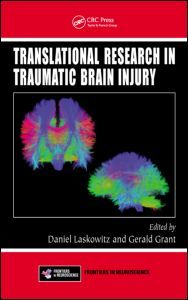Description
Translational Research in Traumatic Brain Injury
Frontiers in Neuroscience Series
Coordinators: Laskowitz Daniel, Grant Gerald
Language: English
Subjects for Translational Research in Traumatic Brain Injury:
Keywords
Traumatic Brain Injury; Mild TBI; TBI; sports-related brain injuries; TBI Patient; post-concussive syndrome; Brain Injury; post-traumatic stress disorder; Head Injuries; rehabilitative medicine; Postconcussive Symptoms; Stem Cell; Neuroinflammation; CCI; Neurosteroids and Traumatic Brain Injury; DAI; Biomarkers and Traumatic Brain Injury; Scalp EEG; PTSD and TBI; Secondary Neuronal Injury; Fluid Percussion Injury; TBI Model; Blood Brain Barrier; Minimally Conscious States; Gap Junction; Blast Injury; BMI; Comorbid Ptsd; Moderate TBI; ICP Monitor; TBI Mouse; FPI Model; Therapeutic Target
· 15.6x23.4 cm · Hardback
Description
/li>Contents
/li>Readership
/li>Biography
/li>
Traumatic brain injury (TBI) remains a significant source of death and permanent disability, contributing to nearly one-third of all injury related deaths in the United States and exacting a profound personal and economic toll. Despite the increased resources that have recently been brought to bear to improve our understanding of TBI, the development of new diagnostic and therapeutic approaches has been disappointingly slow.
Translational Research in Traumatic Brain Injury attempts to integrate expertise from across specialties to address knowledge gaps in the field of TBI. Its chapters cover a wide scope of TBI research in five broad areas:
- Epidemiology
- Pathophysiology
- Diagnosis
- Current treatment strategies and sequelae
- Future therapies
Specific topics discussed include the societal impact of TBI in both the civilian and military populations, neurobiology and molecular mechanisms of axonal and neuronal injury, biomarkers of traumatic brain injury and their relationship to pathology, neuroplasticity after TBI, neuroprotective and neurorestorative therapy, advanced neuroimaging of mild TBI, neurocognitive and psychiatric symptoms following mild TBI, sports-related TBI, epilepsy and PTSD following TBI, and more. The book integrates the perspectives of experts across disciplines to assist in the translation of new ideas to clinical practice and ultimately to improve the care of the brain injured patient.
Epidemiology. Sport-Related Traumatic Brain Injury. Diffuse Axonal Injury. Blood-Brain Barrier Pathophysiology following Traumatic Brain Injury. Cellular and Molecular Mechanisms of Secondary Neuronal Injury following Traumatic Brain Injury. Neuroinflammation. Neurosteroids and Traumatic Brain Injury: Translating Biomarkers to Therapeutics; Overview and Pilot Investigations in Iraq and Afghanistan Era Veterans. Neuroplasticity after Traumatic Brain Injury. Genetic Influences in Traumatic Brain Injury. Modeling Post-Traumatic Epilepsy for Therapy Development. Translational Principles of Neuroprotective and Neurorestorative Therapy Testing in Animal Models of Traumatic Brain Injury. Biomarkers of Traumatic Brain Injury and Their Relationship to Pathology. Advanced Neuroimaging of Mild Traumatic Brain Injury. Epilepsy after Traumatic Brain Injury. Intracranial Pressure Monitoring and Management. Post-Traumatic Stress Disorder: Relationship to Traumatic Brain Injury and Approach to Treatment. Traumatic Brain Injury and Potential for Neuromodulation. Enhanced Functional Outcome from Traumatic Brain Injury with Brain-Machine Interface Neuromodulation: Neuroprosthetic Scaling in Relation to Injury Severity. Neurocognitive and Psychiatric Symptoms following Mild Traumatic Brain Injury.
Edited by
Daniel Laskowitz, MD, MHS, professor of neurology, anesthesiology & neurobiology; and director, Neurovascular Laboratories, Duke University Medical Center, Durham, North Carolina, USA
Gerald A. Grant, MD, FACS, division chief, Pediatric Neurosurgery; vice chair for pediatric neurosurgery and associate program director; and associate professor, Department of Neurosurgery; Stanford University/Lucile Packard Children's Hospital, California, USA
These books may interest you

Traumatic Brain Injury, Part I 280.40 €



